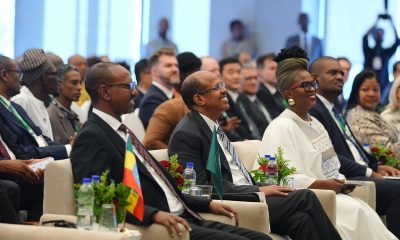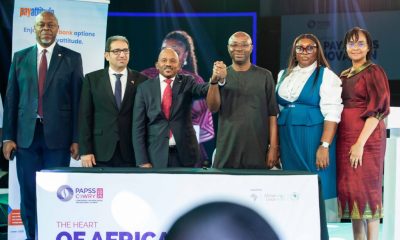Education
Harvard Business School Leverages Africa’s Entrepreneurial Community

By Kestér Kenn Klomegâh
In a recent interview, Program Director Diane Waters highlighted the innovative AfricaLive! online course, meticulously crafted by Harvard Business School professors Caroline Elkins, Tarun Khanna, and Karim Lakhani. Aimed specifically at nurturing talent within the African market, these esteemed educators have tailored a curriculum that addresses the unique challenges and opportunities of the continent’s burgeoning business sector and dynamic entrepreneurial landscape. Here are the interview excerpts:
What are the reasons for starting AfricaLive? How important is this study program for young business leaders in Africa
The AfricaLive! online course was created by Harvard Business School professors to meet the urgent need for skill and knowledge development in Africa’s burgeoning business sector, aiming to equip aspiring entrepreneurs with the necessary tools to navigate and lead in a dynamic environment. Customized for individuals aiming to innovate and expand in the African market, AfricaLive! merges Harvard’s scholarly excellence with the practical wisdom of African industry leaders. The course offers a mix of interactive virtual sessions, small group activities, and asynchronous learning modules, providing a comprehensive and engaging approach to application and learning. Designed to encourage innovation, strategic thinking, and ethical leadership, AfricaLive! readies participants for impactful careers, providing a rich, engaging curriculum and culminating in dual certification from HarvardX and AfricaLive!, affirming their expertise and commitment to driving sustainable change.
Do you believe building the entrepreneurial capacity of the participants will enhance their understanding of the emerging challenges in the changing business landscape
Equipping AfricaLive! participants with essential skills and knowledge enhance their ability to navigate the dynamic and complex markets of Africa. Entrepreneurial capacity extends beyond business management to include innovation, critical thinking, and resilience. As they face technological advances and shifting economic trends, entrepreneurs must adapt and innovate. Training fosters agility and foresight, preparing them to anticipate changes, understand global impacts on local markets, and address emerging challenges, while promoting continuous learning and adaptation in a fast-paced world.
Entrepreneurship is very challenging. In what ways would you argue that the AfricaLive! educational program provides the necessary skills for young vibrant leaders
AfricaLive! is designed to prepare young leaders for the entrepreneurial landscape, blending theoretical knowledge with practical skills in real-world contexts. The course offers discussions with Harvard faculty and African industry leaders, encouraging innovation, creativity, and strategic thinking. It emphasizes resilience, adaptability, and ethical leadership, equipping participants to navigate business uncertainties and contribute positively to society. Networking with peers and industry leaders further enriches the experience, creating a robust support system for aspiring entrepreneurs.
Do you agree that there are diversities in business culture in African countries? What could be the best way to systematize entrepreneurial policies to help Africa’s development
Indeed, there is a rich tapestry of diversity in business culture across African countries, reflective of the continent’s wide array of languages, ethnicities, traditions, and historical backgrounds. Each country, and often regions within countries, has its own unique business customs, economic environments, and regulatory frameworks. This diversity can present both challenges and opportunities for entrepreneurs and policymakers.
To effectively systematize entrepreneurial policies for Africa’s development, a multi-faceted, collaborative approach is essential. Tailoring policies to local contexts, encouraging pan-African dialogue, and involving diverse stakeholders ensures policies are relevant and comprehensive. Emphasizing education and skill development, alongside creating robust support systems like funding, mentorship, and incubators, will equip entrepreneurs to thrive and contribute to a unified and progressive business environment across the continent.
What are the future visions for African Entrepreneurs and the single continental free market (AfCFTA)
The African Continental Free Trade Area (AfCFTA) presents a future of vast opportunities for African entrepreneurs, offering access to a larger market and a more integrated continent. It promises reduced trade barriers, streamlined customs, and a harmonious regulatory environment, enabling entrepreneurs to expand beyond local confines, innovate, and compete more effectively. This vision includes increased intra-African trade, collaboration, and shared knowledge and resources, leading to economic growth, job creation, and sustainable development. Ultimately, AfCFTA positions entrepreneurs at the forefront of transforming Africa into a thriving, unified, and prosperous economy. The course is accessible at the website: https://africalive.education/
Education
Hallos Launches Learning247 Summit

By Adedapo Adesanya
Live-learning and creator-economy platform, Hallos, as part of its expansion drive, has unveiled plans to equip millions of youths and women with digital skills and monetisation opportunities through the Learning247 Hallos Summit, aimed at integrating Nigeria’s South-East into the rapidly expanding global creator economy.
At a sensitisation and stakeholder engagement forum in Enugu, the organisation also called for stronger strategic partnerships with government agencies, educational institutions, development organisations, media houses and private-sector stakeholders to advance the creator economy as a credible engine for mass employment, youth prosperity and inclusive economic growth.
The chief executive of Hallos, Mr Alexander Oseji Uzoma, renewed the call for increased investment in internet penetration, reliable power supply, digital infrastructure, creative studios and youth-focused innovation hubs across Nigeria, especially the South-East.
Describing the creator economy as one of the most accessible and scalable employment frontiers globally, he noted that with basic tools such as a smartphone, internet access and creative skills, young people can build audiences, monetise knowledge and generate sustainable income without heavy capital investment or long career pathways.
According to Mr Uzoma, the creator economy offers low-barrier entry into diverse professions, including content creation, social media influencing, live tutoring and digital coaching, video production, podcasting, graphic design, music and performance arts, digital marketing, merchandise design, e-commerce and community management. These activities support a broader value chain spanning production, distribution, technology and management.
The Hallos co-founder also explained that global projections place the creator economy in the hundreds of billions of dollars, with millions of creators worldwide earning sustainable incomes, stressing that Hallos is focused on localising these opportunities to ensure African youths can participate meaningfully and compete globally.
He further noted that Hallos operates a live-learning and creator-focused platform that integrates education, gamified quizzes, merchandising and voluntary fan donations into a single ecosystem. Through the platform, creators can host live learning sessions and masterclasses, earn from quizzes and challenges, sell branded merchandise, receive voluntary donations, build communities around their expertise and organise monetisable podcasts.
Mr Uzoma said the creator economy, driven by social media platforms, streaming services, digital commerce and content monetisation tools, has evolved into a major global industry capable of generating wealth, creating jobs and expanding export earnings.
He stressed that social media should no longer be viewed as a recreational space but as a viable business environment for wealth creation.
“The focus should not just be on content creation alone but on building businesses around content. It is about value creation and structured digital entrepreneurship,” he said.
He disclosed that Hallos intends to reach about 10 million youths nationwide, with over 5,000 already engaged across its programmes, while placing strong emphasis on bridging the gender gap by empowering women and girls through targeted digital training, mentorship and access to monetisation platforms.
As the digital economy continues to expand, Hallos said the creator economy stands out as a practical and scalable solution to youth unemployment, offering low entry barriers and global earning potential.
The company reaffirmed its commitment to bridging the gap between talent and income, enabling young Africans to earn well above minimum wage through creativity, knowledge and structured participation in the global digital economy.
Education
Bayero University PG Students to Enjoy Dangote’s N1.5bn Scholarship

By Modupe Gbadeyanka
Post-graduate students of Bayero University Kano (BUK) will benefit from a scholarship worth about N1.5 billion from the Aliko Dangote Foundation (ADF).
The businessman put down the funds to support eligible MBA, entrepreneurship, and management postgraduate students of the institution under an initiative known as MHF Dangote Graduate Business Scholarship.
At a ceremony on Tuesday, the foundation and the school signed a Memorandum of Understanding (MoU) at the auditorium of the Dangote Business School, Kano.
The deal is to provide N300 million annually over five years as scholarship awards to the beneficiaries, who will receive N150,000 each per session, beginning with the 2024/25 academic session. This is equivalent to 50 per cent of the current N300,000 fee paid by the post-graduate students. There are 1,225 students in the Business School (696 fresh and 529 returning students).
One of the beneficiaries, Mr Khalid Bababubu, who is into manufacturing and specialises in MBA, Finance and Investment, thanked the organisation for the gesture.
“We are happy to be beneficiaries of this initiative. Education is the bedrock of national development, and we will not take this scholarship for granted,” he said.
A representative of ADF, Ms Mariya Aliko Dangote, said, “Our vision at the Foundation is to build human capital that translates into economic opportunity.
“Strengthening business and entrepreneurship education is critical to turning knowledge into enterprise, innovation, and jobs. This scholarship deepens our commitment to Dangote Business School by investing directly in the next generation of business leaders and change-makers.”
On his part, the Vice Chancellor of Bayero University Kano, Prof. Haruna Musa, said, “This support comes at a critical time for many families. Beyond financial relief, it strengthens the Business School’s role as a centre for developing entrepreneurial and management talent, particularly for women who are increasingly taking leadership roles in enterprise.”
It was explained that newly admitted students will receive automatic tuition reductions during registration, and returning students who have already paid in full will receive rebates. The N300 million allocation is structured to cover all eligible postgraduate students based on current enrolment capacity.
Any unutilised balance in the first year will be retained within the Dangote Business School development envelope to strengthen learning infrastructure and digital academic capacity, ensuring continued enhancement of the academic environment.
The MHF Dangote Graduate Business Scholarship is distinct from ADF’s recently announced nationwide STEM education interventions.
Education
Entries for InterswitchSPAK 8.0 Begin, Over N40m up for Grabs

By Aduragbemi Omiyale
Senior secondary school students across Nigeria have been invited to apply and demonstrate their academic excellence on a national stage in the eighth edition of the prestigious national science competition known as InterswitchSPAK.
The contest is organised by Interswitch, Africa’s leading technology company focused on creating solutions that enable individuals and communities prosper.
Registration for InterswitchSPAK 8.0 via www.interswitchspak.com has opened and will close on Friday, May 24, 2026. For the first time, in addition to group registrations through schools, parents can also register their individual children for the competition.
This year’s edition features a scholarship pool exceeding N40 million, with Interswitch expanding the prize structure to ensure broader impact.
The overall winner will receive a N15 million tertiary scholarship, including monthly stipends. The first runner-up will be awarded a N10 million scholarship, including monthly stipends; while the second runner-up will receive a N5 million scholarship, also including monthly stipends. All scholarships are payable over 5 years. Also, the top 9 finalists will all receive brand new laptops and other exciting prizes.
In addition to the top prizes, Season 8 introduces enhanced rewards for student finalists ranked 4th to 9th, as well as increased recognition for teachers supporting qualifying students from 1st to 9th place. This expanded structure reinforces Interswitch’s commitment to rewarding academic excellence and recognising the critical role educators play in shaping student success.
“At Interswitch, we strongly believe that Nigeria’s future will be shaped by how well we nurture today’s young minds. InterswitchSPAK goes beyond competition; it is a long-term commitment to empowering students and supporting teachers who are laying the foundation for innovation, problem-solving, and national development.
“As we launch Season 8, we remain focused on creating opportunity, rewarding merit, and inspiring excellence across Nigeria,” the Executive Vice President for Group Marketing and Communications at Interswitch, Ms Cherry Eromosele, said.
Designed to empower young minds in the Science, Technology, Engineering, and Mathematics (STEM) areas, InterswitchSPAK identifies, nurtures, and rewards students while equipping them with the skills and knowledge required to excel in STEM fields and drive innovation.
Over the past seven seasons, InterswitchSPAK has positively impacted thousands of students across the country, offering full university scholarships, mentorship opportunities, and national recognition for outstanding academic performance.
Beyond these rewards, the programme has consistently reinforced the importance of STEM education as a critical driver of innovation, problem-solving, and sustainable national development.
Through a transparent, technology-enabled selection process, InterswitchSPAK has also promoted educational equity by providing students from diverse socio-economic backgrounds with equal access to opportunity, ensuring that performance and merit remain central to success.
-

 Feature/OPED6 years ago
Feature/OPED6 years agoDavos was Different this year
-
Travel/Tourism10 years ago
Lagos Seals Western Lodge Hotel In Ikorodu
-

 Showbiz3 years ago
Showbiz3 years agoEstranged Lover Releases Videos of Empress Njamah Bathing
-

 Banking8 years ago
Banking8 years agoSort Codes of GTBank Branches in Nigeria
-

 Economy3 years ago
Economy3 years agoSubsidy Removal: CNG at N130 Per Litre Cheaper Than Petrol—IPMAN
-

 Banking3 years ago
Banking3 years agoSort Codes of UBA Branches in Nigeria
-

 Banking3 years ago
Banking3 years agoFirst Bank Announces Planned Downtime
-

 Sports3 years ago
Sports3 years agoHighest Paid Nigerian Footballer – How Much Do Nigerian Footballers Earn






















